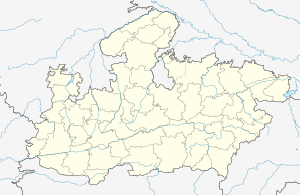Kulhor
Kulhor is a village in the Bhopal district of Madhya Pradesh, India. It is located in the Berasia tehsil.[1]
Kulhor | |
|---|---|
village | |
 Kulhor  Kulhor | |
| Coordinates: 23.641727°N 77.518787°E | |
| Country | India |
| State | Madhya Pradesh |
| District | Bhopal |
| Tehsil | Berasia |
| Population (2011) | |
| • Total | 2,111 |
| Time zone | UTC+5:30 (IST) |
| ISO 3166 code | MP-IN |
| Census code | 482196 |
Demographics
According to the 2011 census of India, Kulhor has 448 households. The effective literacy rate (i.e. the literacy rate of population excluding children aged 6 and below) is 70.85%.[2]
| Total | Male | Female | |
|---|---|---|---|
| Population | 2111 | 1109 | 1002 |
| Children aged below 6 years | 320 | 164 | 156 |
| Scheduled caste | 877 | 466 | 411 |
| Scheduled tribe | 2 | 1 | 1 |
| Literates | 1269 | 782 | 487 |
| Workers (all) | 867 | 583 | 284 |
| Main workers (total) | 680 | 506 | 174 |
| Main workers: Cultivators | 399 | 297 | 102 |
| Main workers: Agricultural labourers | 180 | 133 | 47 |
| Main workers: Household industry workers | 2 | 1 | 1 |
| Main workers: Other | 99 | 75 | 24 |
| Marginal workers (total) | 187 | 77 | 110 |
| Marginal workers: Cultivators | 46 | 16 | 30 |
| Marginal workers: Agricultural labourers | 129 | 53 | 76 |
| Marginal workers: Household industry workers | 1 | 1 | 0 |
| Marginal workers: Others | 11 | 7 | 4 |
| Non-workers | 1244 | 526 | 718 |
gollark: I have an addon called "tab suspender" which lets me manually unload tabs to save RAM and let me have hundreds without problems.
gollark: Hmm, I only have about 310 tabs open.
gollark: This is very irritating. My internet connection is dropping packets all over the place, and randomly disconnecting entirely. I blame BT.
gollark: I feel like a lot of the time people tend to buy NVMe disks because "faster" even though they're not massively beneficial most of the time.
gollark: The tower is an HP ProLiant ML110 G7. Or something like that.
References
- Lok Seva Kendra, Berasia
- "District Census Handbook - Bhopal" (PDF). 2011 Census of India. Directorate of Census Operations, Madhya Pradesh. Retrieved 20 July 2015.
This article is issued from Wikipedia. The text is licensed under Creative Commons - Attribution - Sharealike. Additional terms may apply for the media files.